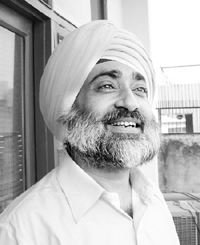| Home / Living in China / What's New | Tools: Save | Print | E-mail | Most Read |
| Sikh Scholar Discovers Road Less Traveled |
| Adjust font size: |
It was in Baoshan that Singh felt closest to home. "When I woke up in the morning, I had a feeling that I was walking towards Singh, 45, is resident fellow economist at the Center for the Study of Developing Societies and honorary fellow at the Since January 1997, he has visited In He has attended economic forums at Bo'ao, Hainan, and been involved in a number of multilateral projects, such as the Forum on Regional Cooperation among Singh said he made a conscious decision to work on That was more than 10 years ago, and he recalled that people were surprised that he was "wasting his talent" on "Until I joined, there was no economist at the center," he said. "But I found He also believed that as an Indian he would be offering a different perspective from that of Western scholars. "It was not so easy; we didn't have materials, or opportunities to travel, for instance," he said. But things have changed, especially now " "Today if someone asks me what I work on I say ' Moreover, he is witnessing history. "I am part of history," he said. Whenever he visits a city for a second time it is transformed. "The same street is no more and new buildings have gone up, and I find Academically, he has discovered that his Chinese colleagues are good listeners. "My lectures in "Dr Singh is very open-minded, and has an in-depth understanding of China-India relations and the economic development of the two countries," said Lu Feng, deputy director of "He differs from many other international experts on "He is always willing to communicate with Chinese people, he visits In fact, Singh said his motto is to walk and to go to places off the tourist trail. He has taken buses to rural counties outside big cities "to experience the ordinary daily life of the Chinese and see the real thing ( Of course, he invites stares: A Sikh, he has a moustache and wears a turban. People also ask him questions, such as where he comes from. Once in "But Chinese children always know I come from "I never find it hard to communicate with him, because he really knows many Chinese people's habits," Gao said. "When we talk about academic issues, he can be very serious, but he is also very humorous in daily life." He has encountered unhappy moments in "It was shocking to me in the street when this question was posed," he said. He said he has more than 100 Chinese friends to count on. "Wherever I am in Professor Lu recalled that Singh took him to many bookstores and introduced him to some really useful works during his visits to "I left some money for him for some books he gave me to help my research, but when he came to (
|
| Tools: Save | Print | E-mail | Most Read |
 |
| Related Stories |
|
